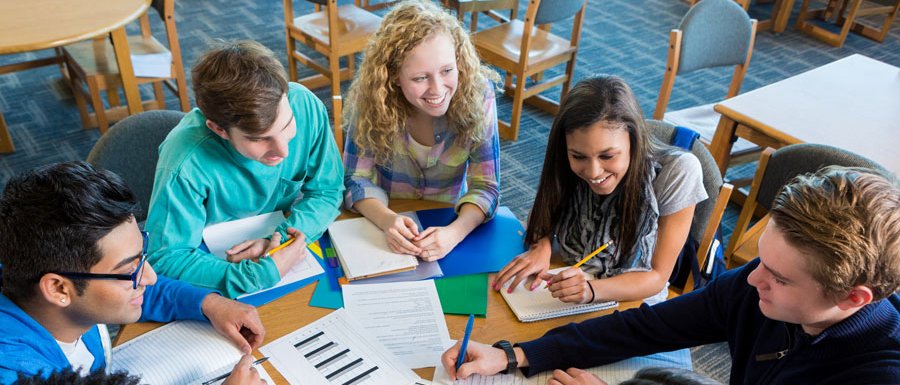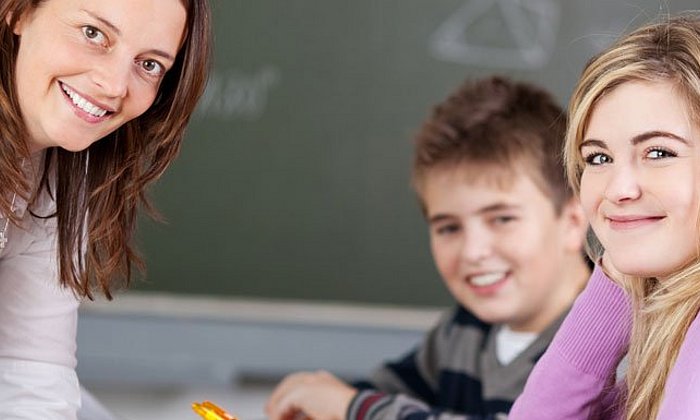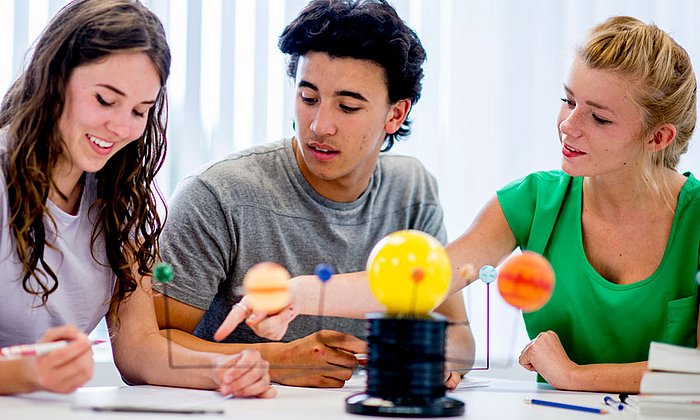German youth successful at solving complex problems in groups
PISA Study: Good results in teamwork

In the spring of 2015 the sixth international PISA study tested the skills of 15-year-old secondary school students in various areas (the study was presented in 2016). In 32 member states of the Organisation for Economic Co-operation and Development (OECD), which is coordinating the study, an additional test on what are referred to as collaborative problem-solving skills was administered and has now also been evaluated. In Germany approximately 1,900 secondary school students from all school types took part in the test.
The 15-year-olds were presented with various assignments on a computer and were asked to find solutions together with several other persons, who were simulated by the test program. For example, the group was asked to find a destination for a school-exchange field trip, to research various advantages and disadvantages in the process and to resolve a misunderstanding that had been built into the test.
Germany in the vanguard for the share of highly skilled students
Secondary school students in Germany were better at solving this test (525 points) than the average 15-year-olds in the OECD countries (500 points). However, the gap between Germany and the leader Japan (552 points) is similar in size to Germany's lead over the average. This evaluation groups Germany together with Australia, the USA, Denmark and the United Kingdom, whose results do not significantly differ from one another.
At 13 percent, Germany belongs to the vanguard in terms of the share of highly skilled secondary school students. In terms of the share of especially low-skilled students, Germany did much worse than the leader: With a share of 21 percent, Germany is at the average for the OECD, with its share almost twice as large as that of Japan.
Regular groupwork in classroom instruction
In a questionnaire integrated in the PISA study, about half of all German teachers indicated that they include groupwork in classroom instruction at least once a week – more than the international average. And the values assigned by the students when asked how much fun they have working in a team and how much it helps them make progress were also slightly above average.
"Our professional and everyday lives present us with problems are unsolvable unless we collaborate with other people. In the working world we find an increasing number of these tasks for which no routine exists," says Prof. Kristina Reiss of the Center for International Student Assessment (ZIB) at the Technical University of Munich (TUM) and coordinator of the German section of the PISA study. "This is why it is good that this collaborative work approach is practiced on a regular basis and the youth have acquired an above-average skill level compared to the OECD states. I'm also glad to see that the share of highly-skilled students in Germany is large. However, schools should concentrate more on the one-fifth of students who are barely able to work together with other people to solve complex problems."
Girls significantly more skilled than boys
In comparing the school types in Germany's educational system, the students at secondary grammar school ("Gymnasium") had better results (585 points) than the 15-year-olds at other school types (497 points). But the latter group still scored at a level comparable to the general average in the OECD states. They are also close to the international average in terms of the breakdown according to the shares of strong and weak performance.
Students' socio-economic background is less correlated with the collaborative problem solving skill level than with other skills tested in the 2015 PISA study. In Germany students with an immigrant background score an average of 49 points less than those without an immigrant background (OECD average: 36 point difference). However, this difference is smaller than the difference for example in natural sciences (61 points).
The researchers identified a clear connection with gender: Girls scored 540 points, 30 points more than the boys – an order of magnitude otherwise found only in connection with reading skills. Although smaller, the difference favored the boys in the 2012 PISA study, when complex assignments had to be solved alone. This is an indication that the girls have very high skill levels when it comes to teamwork. This is also reflected in the fact that girls indicated having more fun in groupwork than boys did.
2015 PISA study:
Secondary school students in Germany achieved good results in natural sciences, mathematics and reading in the 2015 PISA test. Their skill levels were significantly higher than the average levels for the OECD states. The study was presented in December 2016.
The German part of the "Programme for International Student Assessment (PISA)" is conducted by the Center for International Student Assessment (ZIB) at Technical University of Munich (TUM) on behalf of the German Standing Conference of the Ministers of Education and Cultural Affairs and the German Federal Ministry of Education and Research. In addition to TUM, the German Institute for International Educational Research (DIPF) and the Leibniz Institute for Science and Mathematics Education (IPN) are also involved in ZIB.
Publication:
Zehner, F., Weis, M., Vogel, F., Leutner, D. & Reiss, K. (2017). Kollaboratives Problemlösen in PISA 2015: Befundhöhepunkte rund um Deutschland. Munich: Technical University of Munich. doi: 10.14459/2017md1401788
More information:
Contact:
Prof. Dr. Kristina Reiss
Center for International Student Assessment at Technical University of Munich / TUM School of Education
Tel: +49 89 289 22798 (press office)
kristina.reiss@tum.de
Technical University of Munich
Corporate Communications Center
- Klaus Becker
- klaus.becker@tum.de
- presse@tum.de
- Teamwebsite



